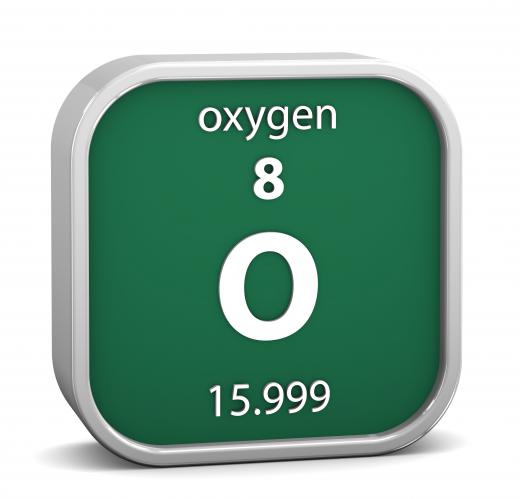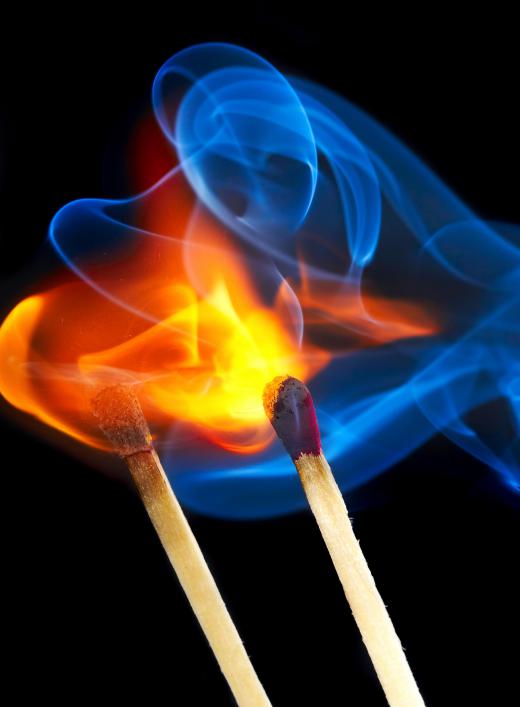What are Chemical Reactions?
 Michael Anissimov
Michael Anissimov
Chemical reactions occur whenever bonds are formed or broken between molecules. Why certain atoms combine with which other atoms is a complex question which is explained exhaustively by quantum chemistry. The simple version is that atoms bond together electromagnetically based on the properties of their electron shells. There are various types of chemical bonds; in general, the more closely overlapping the electron shells are, the stronger the bond is. Chemical reactions happen when heat, radiation, and/or foreign chemicals disturb an equilibrium condition and cause the breakage and/or formation of chemical bonds, thereby giving rise to new molecular forms.
Chemical reactions can be classified into a few categories. The simplest is probably synthesis, where two or more molecules or atoms combine into a new molecule. For example, iron plus oxygen forms iron oxide, or rust. The opposite of synthesis is analysis, or chemical decomposition, where a molecule breaks apart into its constituents. This occurs when the electrolysis of water produces oxygen and hydrogen gas. Substitution, another variety of chemical reaction, happens when a more reactive atom or molecule ejects a part of another molecule and takes its place. This happens whenever an acid eats into a metal. And finally, there is combustion, which occurs when something like wood undergoes oxidation and is incinerated.

The number of possible chemical reactions in nature is extremely huge. There are more than billions - because very large molecules have so many components, the number of possible reactions is immense. This is particularly true in organic chemistry, where million-atom molecules are the norm. Life is possible because of the tremendous amount of possible chemical configurations achievable by organic molecules.

In organics especially, special molecules called enzymes are capable of accelerating chemical reactions without themselves undergoing any chemical change. Another word for this is a catalyst. Without catalytic enzymes, the everyday cascade of the numerous reactions that make up life would take too long to be practical. In cars, catalytic converters process exhaust from the engine to make it far less toxic than it would be otherwise. A very important task of chemists is to thoroughly understand catalysts.

It is impossible to understate the importance of chemical reactions in the world we live in. Numerous scientific advancements occur when we understand even just a little bit more about chemistry. Perhaps one of the most important to human civilization is the Haber-Bosch process - a chemical reaction where nitrogen from the atmosphere is compressed and combined with other chemicals in a superheated environment to create artificial fertilizer. Without it, we wouldn't be able to grow all the plants we use to feed ourselves, and the world population would be far smaller and more hungry.
AS FEATURED ON:
AS FEATURED ON:















Discussion Comments
If I were to place an iron block into baltomic acid, what would happen?
doing my chemistry laboratory experiment report form. found sentences for conclusions. Thanks!
A number of years ago I saw a specialist for allergies, and was tested for same. My diagnosis was I had no allergies. "Then why do I feel like I am suffering from allergies all the time?"
The doctor told me I was probably suffering from chemical reactions. He said chemical reactions can be a whole lot worse to deal with than allergies.
Can someone please tell me what chemical reactions are in the human body. What is happening in my body that causes this. I am pretty sure of one thing that takes place, and that is, a large number of medications the doctors give me to try to help medical problems. I end up taking fairly serious reactions to them and have to come right back off them again.
One type of medication I have big problems with are antidepressants. I have been having depression on and off since I lost my son from the result of a MVA back in 1995. They are still trying to get me on something I can use without having all of these horrible effects. I don't know for sure if this particular problem is chemical reactions. I get them much worse than other people who have side effects. All I know is antidepressants are pretty much all chemicals, if not all chemicals. There are other things I use that have a lot of chemicals and make me not feel well at all. So exactly what or how would a person feel when they are having chemical reactions and what takes place that causes in the human body that process of reaction?
I don't know if this has anything to do with what I just told you, but there was a lady sharing a room in the hospital once. She had had surgery that left her with horrible pain, but could not take as much as a tylenol or aspirin for it. She kept insisting to the nurses that if she takes any kind of pain medication at all, her muscles go all out of whack on her. This left her in much worse pain than the pain from the surgery did. They insisted that she take something because they had to get her up out of bed for a bit even if she just sat in her chair for awhile.
She finally agreed to take extra strength tylenol, but once more warned them of the condition it would put her muscles in. Well, they got her up in the chair, and when they came back about a half hour or so later to put her back in bed, she could hardly move herself because her muscles went all out of wack and she was in agony.
The reason for me telling you her story is I also have a severe muscle disorder that I am in pain with all the time and have to take the strongest of pain medication on a regular basis. My muscles also go the way hers did, but I don't know if it's from meds.
I often wonder ever since I met her, if my muscle problem is medication induced. I keep thinking I would like to try coming off the meds that I take sometime, just to see in what way my system would respond to it. Maybe that is what is causing most of my problems and severe muscle pain.
Sorry for making this so long to read, but I just had to explain it to you as best as I could.
Do you know anything about this medical problem I have? If I could only find some one who knows what is causing this muscle disorder and/or chemical reactions. Thank you for your time and I hope you will be able to respond to this to let me know if you have any info about this.
Can we mix hexamine with oxalic acid? What will be reaction on ferrous metal. The requirement is to improve the surface roughness with the help of a tumbling machine, along with ceramic stones.
can i know what is the chemical reaction when hydrogen peroxide breaks down to oxygen and water?
Fe(s) + o2(g) + h2o(i) ----------->fe2o3. X h2o(5)
i like chemistry!
i really don't like science but i like doing science projects.
some of the factors are wetness and teamperature.
i love science.
Hydrogen peroxide is added to iron pyrite, what is the chemical reaction
What factors can speed up and slow down the chemical reaction of Rusting?
Post your comments